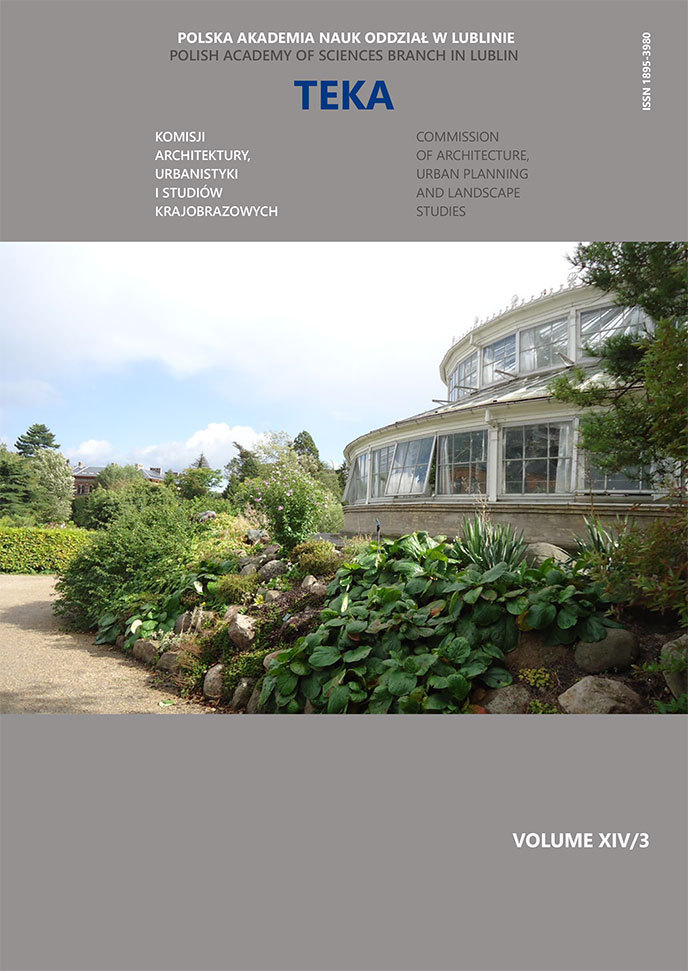Psychosomatic aspects of healthcare facility design solutions
Article Sidebar
Issue Vol. 14 No. 3 (2018)
-
Psychological aspects of architecture and urban planning in crime prevention
Michał Skorupski, Joanna Jabłońska7-14
-
“Policyjny Dom Zdrowia” (P.D.Z., Policemen’s Health Center) as the example of a big sanatorium facility in the valley of the Prut River in the Hutsul region
Jacek Czubiński15-23
-
Adaptive reuse of commercial and public buildings in Wroclaw Old Town in Poland. The occupant’s safety and comfort versus preservation of authenticity of monumental buildings
Krystyna Kirschke, Paweł Kirschke, Elżbieta Komarzyńska-Świeściak24-41
-
Compositional situation: analysis of the location of two sculptures in Mexico City
Leszek Maluga42-49
-
Art in public space as a tool of social inclusion
Agnieszka Chęć-Małyszek50-60
-
Origins of the Kalinowszczyzna district in Lublin: history, design principles and current condition
Michał Dmitruk61-70
-
Emotional reactions of the respondents compared to different ways of perceiving the square in front of the WICA building of the Lublin University of Technology
Olga Skoczylas71-78
-
Psychosomatic aspects of healthcare facility design solutions
Ewa Pruszewicz-Sipińska, Agata Anna Gawlak, Magda Matuszewska79-88
-
Residential buildings in healthcare resort Szczawno-Zdroj in the second-half of 20th century
Marek Piróg89-95
-
Brześć – the city of an eastern borderlands, architecture of the 2nd Republic of Poland
Krystyna Paprzyca96-101
-
Spatial concepts of the work environment
Grzegorz Schnotale102-108
-
The earliest public green areas connected with Jelenia Góra, part. 2
Marzanna Jagiełło, Wojciech Brzezowski109-118
-
The Wrocław urban planning from general plans to studies on land use planning
Robert Masztalski, Piotr Kryczka119-136
-
Architecture of tourist and leisure facilities on the Kłodzko-Orlice borderland, on the example of Zieleniec and Lasówka
Jacek Suchodolski137-155
Archives
-
Vol. 16 No. 4
2020-12-30 11
-
Vol. 16 No. 3
2020-09-30 10
-
Vol. 16 No. 2
2020-06-30 11
-
Vol. 16 No. 1
2020-03-31 10
-
Vol. 15 No. 4
2019-12-30 6
-
Vol. 15 No. 3
2019-10-31 9
-
Vol. 15 No. 2
2019-06-28 12
-
Vol. 15 No. 1
2019-03-29 13
-
Vol. 14 No. 3
2018-10-28 14
-
Vol. 14 No. 2
2018-06-29 14
-
Vol. 14 No. 1
2018-03-30 13
-
Vol. 13 No. 4
2017-12-29 8
-
Vol. 13 No. 3
2017-09-29 9
-
Vol. 13 No. 2
2017-06-30 10
-
Vol. 13 No. 1
2017-03-31 10
-
Vol. 12 No. 4
2016-12-30 12
-
Vol. 12 No. 3
2016-09-30 10
-
Vol. 12 No. 2
2016-06-30 9
-
Vol. 12 No. 1
2016-03-31 8
Main Article Content
DOI
Authors
ewa.pruszewicz-sipinska@put.poznan.pl
magda.matuszewska@put.poznan.pl
Abstract
The purpose of this paper is to present the social and psychological aspects of the impact of architecture of a hospital on all its users.
The authors analyse the impact of factors shaping the architectural space of a hospital on the behaviour of patients and on the mutual relations between all the participants of the hospitalisation process.
The hospital space has been presented from the point of view of the psychophysical needs of a patient, from the point of view of the medical staff and the visitors. The analysis includes the assessment of the quality of architectural space of a hospital as a place intended for the medical treatment, which is to facilitate the recovery of the patient and fast response of the staff in emergency situations.
References
Abrams Ch. (1971). The Language of Cities: A Glossary of Terms, 1, wg Marty Spasiewicz.
Adams A., Theodore D., Goldenberg E., McLaren C., McKeever P. (2010). Kids in the atrium: Comparing architectural intentions and child’s experiences in a pediatric hospital lobby, Social Science & Medicine 70, str. 658−667.
Bańka A. (1985). Psychologiczna struktura projektowa środowiska. Studium przestrzeni architektonicznej”. Poznań: Wydawnictwo Politechniki Poznańskiej.
Bell P.A., Greene Th.C., Fisher J.D., Baum A. (2004). Psychologia środowiskowa. Gdańsk: Gdańskie Wydawnictwo Psychologiczne.
Cherulnik P.D. (1193). Applications of Environment-Behavior Research: Case Studies and Analysis. Cambridge: Cambridge University Press.
Czyński M. (2006). Architektura w przestrzeni ludzkich zachowań. Wybrane zagadnienia bezpieczeństwa w środowisku zbudowanym. Szczecin: Wydawnictwo Uczelniane Politechniki Szczecińskiej.
Dalke H., Little J., Niemann E., Camgoz N., Setadman G., Hill S., Stott L. (2006). Colour and lighting in hospital design. Optics and Laser Technology 38, str. 243−365. DOI: https://doi.org/10.1016/j.optlastec.2005.06.040
Gawlak A., Matuszewska M., Szuba P., Jakość przestrzeni architektonicznej dedykowanej ochronie zdrowia a potrzeby mieszkańców w kontekście założeń idei healthy cities na przykładzie Poznania, PUA Przestrzeń Urbanistyka Architektura, 1/2018, https://doi.org/10.4467/00000000PUA.18.002.8610 DOI: https://doi.org/10.4467/00000000PUA.18.002.8610
Gawlak A., Matuszewska M., Szuba P, Personnel-centred study for advancing the quality of hospital care, European Healthcare Design 2018, Sallus, Londyn 2018, http://www.salus.global/article-show/ehd2018-p08, dostęp:07.07.2018
Gawlak A., Pruszewicz-Sipińska E. (2013). Architektura przestrzeni ogólnodostępnej w szpitalu. Pacjent i personel, Pielęgniarstwo Polskie 4/2013. Poznań: Wydawnictwo Naukowe Uniwersytetu Medycznego.
Gehl J. (2009). Życie między budynkami. Użytkowanie przestrzeni publicznych. Cracow: Wydawnictwo RAM.
Juraszyński J., Nitsch A., Porębowicz S., Radwański R. (1973). Projektowanie obiektów służby zdrowia. Warszawa: Wydawnictwo Arkady.
Lenartowicz J.K. (2007). Słownik psychologii architektury. Cracow: Wydawnictwo Politechniki Krakowskiej.
Meuser P. (2010). Construction and Design Manual. Medical Practices. Building Typologies Public Health. Berlin: Wydawnictwo DOM publishers.
Nickl H., Nickl-Weller Ch. Hospital Architecture (2007). Wirginia: Wydawnictwo Verlagshaus Braun.
Niezabitowska E. (red). (2004). Wybrane elementy facility management w architekturze. Gliwice: Wydawnictwo Politechnik Śląskiej.
Pawłowska K. (red). (2010). Zanim wybuchnie konflikt. Idea i metody partycypacji społecznej w ochronie krajobrazu i kształtowaniu przestrzeni. Cracow: Foundation – Fundacja Partnerstwo dla Środowiska.
Pruszewicz-Sipińska E. (red). (2015). Architecture & Health. Poznań.
Spasiewicz M. (2011). Architektura i partycypacja. Czasopismo Miasto i obywatel 36.
Ulrich R. S. (2008). A Review of the Research Literature on Evidence-Based. Healthcare Design, Health Environments Research & Design, 1(3). DOI: https://doi.org/10.1177/193758670800100306
Zumthor P. (2010). Myślenie architekturą, Karakter, Kraków
Article Details
Abstract views: 295


